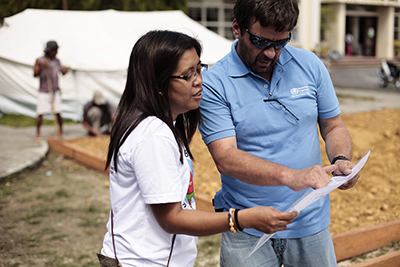
The full scale destruction and devastation wrought by super Typhoon Yolanda was a tragedy that affected the lives of millions but now we can find a way to build a sustainable health system for the future says Dr. Julie Hall, WHO Country Representative.
As the nation marks six months since the Philippines worst ever natural disaster, communities are slowly rebuilding their lives.
"The WHO in support of the Department of Health, have moved from the initial emergency phase which focused on coordinating the arrival and dispersal of more than 150 foreign medical teams, coordination of emergency health services and supplies, and prevention of disease outbreaks to addressing the longer term health issues facing communities," said Dr Julie Hall, WHO Country Representative.
"WHO continues to map the state of repair and rebuilding of the 582 public health facilities that were damaged or destroyed and to provide advice to ensure government and aid monies are directed to where the need is the greatest."
"We need clean and safe health facilities for the 70,000 births expected in the next three months as well as for those individuals who have ongoing health complications from diseases such as diabetes, cancer and tuberculosis," Dr. Hall stated.
The WHO is working in communities to prevent disease outbreaks through health and hygiene promotion and ensuring families have access to, and use, clean water for drinking and washing.
"Six months after the event, we are seeing the emergence of mental health problems in communities with people coming to terms with the enormity of their loss, whether of loved ones, homes or livelihoods," said Dr Hall. "The WHO has been training local health workers in psychological first aid and community based mental health care to help address physical and mental health needs. We are also funding activities aimed at supporting the thousands of people disabled as a result of injuries caused by the Typhoon."
"Six months on, we have made real progress, but the resilience of the Filipino spirit alone will not be enough. Ensuring the resilience of the health infrastructure, universal health care for all Filipinos, and continued investments in health promotion are all required."
"The country needs a healthy population to sustain its successful economic development,” said Dr. Hall. “The chance to make a sound investment for the future by strengthening health systems and infrastructure is now. We need to continue to place health at the heart of all healing.”

